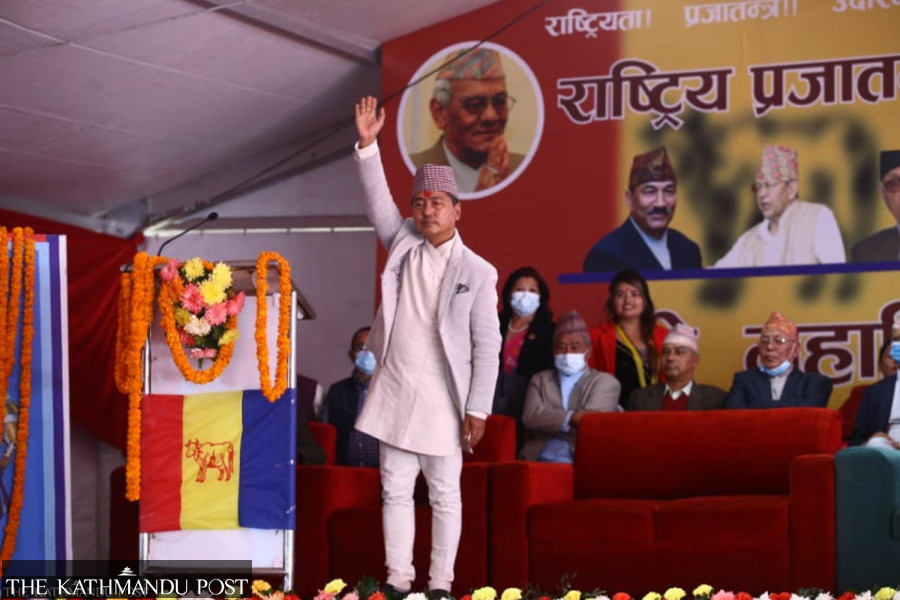Politics
How serious is the Rastriya Prajatantra Party about promoting youth leaders and meritocracy?
Experts say the party’s move is aimed to better its electoral prospects rather than promote meritocracy and youth leadership.
Nishan Khatiwada
The right-wing Rastriya Prajatantra Party on July 21 sought applications from leaders below 40 years to appoint 20 central committee members. Party leaders say the move aims to encourage youth participation and promote meritocracy. But observers have doubts.
The party has said that at least 50 percent of its central members will be women. They have set a 30-day deadline for the application process.
Party spokesman Sagun Sundar Lawati said they want to promote youths’ participation in the central committee on the basis of merit.
The party has set six criteria to promote meritocracy: emerging academics and women; leaders who are active and display potential in political leadership; those who are committed to party ideology, policies and goals; who are knowledgeable in information technology and are active on social media; are well-versed in Nepal’s multiple languages and aim to fight the direct elections.
Chief of the party’s publicity department, Mohan Kumar Shrestha, said that after the applications are received, they will shortlist members, who will be appointed central members by a committee. “We will also interview the applicants as part of the selection process,” Shrestha said.
Party leaders say that the move is part of the ‘New RPP’—Navin RPP—campaign. They say as the leadership has been transferred to the new generation, the party has been planning to induct youths to the central committee based on merit and the principle of proportional inclusion.
In the general convention held in December 2021 in Kathmandu, Rajendra Lingden, comparatively a younger leader from eastern Nepal, defeated Kamal Thapa, a veteran politician who led the party for long.
After Lingden assumed power, the RPP fared well in the major elections held in 2022, winning 14 seats in total to become the fifth largest party in the federal parliament. In the 2017 elections, when Thapa was in power, only Rajendra Lingden, the current chairperson of the Rastriya Prajatantra Party, won the direct elections, from Jhapa-3. The party failed to cross the three percent threshold to qualify for Proportional Representation seats.
Thus, the party has learned that it would be better served by bringing in the meritorious youths and leaders, say leaders.
“We have sought young leaders who are educated, and have a good knowledge of history, geography, politics and vision for socio-economic transformation,” Shrestha said. “They should be good at handling social media. It would be better if they have knowledge of other native languages apart from their mother tongue.”
Though party leaders claim that their motive is to promote youth participation and meritocracy, political analysts say there are many bases for suspicions.
Sanjeev Humagain, a political analyst who is also a faculty member of the PhD programme for Political Science and International Relations at the Tribhuvan University, said the idea of using meritocracy to bring the party members and file their candidacy in elections is new in Nepal but not in the world. “Such a strategy is common during the election to improve poll results,” Humagain said. “It shows that they have given space for youths.”
The newly emerged Rastriya Swatantra Party became the fourth largest force in the Parliament in its first attempt by cashing in on the public’s frustrations towards the old leadership in the traditional parties. It fielded youths as candidates and attracted a large number of voters. Political parties of various stripes have since then been trying to lure youths to join them.
However, according to Humagain, the main question is, “Is the RPP focusing to reform the party and the system or just to win the election?” He added that the party inducted old leaders in the Cabinet last time. “They should have promoted youths back then if they were so serious.”
In the Council of Ministers led by Maoist chair Pushpa Kamal Dahal, RPP chair Lingden held the Ministry of Energy, Water Resources and Irrigation, vice chairman Bikram Pandey the Ministry of Urban Development, leader Dhruba Bahadur Pradhan the Ministry of Law, Justice and Parliamentary Affairs, and leader Deepak Bahadur Singh was the state minister for Energy. They resigned en masse in February.
For another political analyst Rajendra Maharjan, the RPP has no clarity on the progressive agenda that can attract youths to join them. “RPP has jumped into the bandwagon of wooing youths to join the party, inspired by the major elections,” he said. “But there is a suspicion that the party has been trying to showcase the youths’ presence just to grab the public’s attention and deny them any real chance during elections.”
According to Maharjan, the main question is whether the party helps youth leaders to reach decisive positions through which they can exercise power. “I don’t see the party focusing on such concerns,” he said.




 14.12°C Kathmandu
14.12°C Kathmandu














